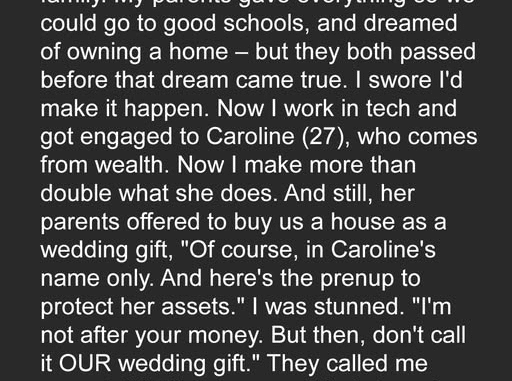
When my fiancée’s wealthy parents offered a dream house as a wedding gift, it came with a catch: my name couldn’t be on the deed. Their terms tested my pride, but our solution proved love builds stronger foundations than money.
I’m Lucas, 30, and every step I’ve taken—my degree, my career, my future—I’ve earned alone. When my fiancée’s family tried to control our gift, I fought for a home that belongs to us both.
Growing up, my parents dreamed of a house—a modest place with a garden for Mom’s roses and a porch for Dad’s coffee. “We’ll own something to pass down,” Dad said at our weekly dinners. But he passed from a heart attack at 16, and Mom lost her fight with COVID-19 four years ago, alone in a hospital. “We tried,” the nurse said, but she was gone too fast.
At their graves, I vowed to finish their dream. “I’ll buy a house for us,” I whispered. “With tulips everywhere.”
I clawed my way through community college, juggling scholarships, loans, and barista shifts. Transferring to a state university took years, but my degree felt like a monument to their sacrifice. Now, at a leading tech startup, I manage projects that reach millions, saving for a home while supporting my aunt. Success isn’t my salary—it’s knowing every dollar is mine.
My fiancée, Sophie, 28, grew up differently—private academies, beach house vacations, a family dripping in wealth. Her dad, Charles, oversees investments; her mom, Elise, curates art for elite clients. Sophie, though, is grounded. “It’s us, not their money,” she said one night, eating tacos from a street vendor. “We’re bigger than their world.”
Living together, we split costs fairly, even though my income doubled hers. “You’ve never asked for a cent from my family,” she said at the store. “That’s why I love you.”
I didn’t want their wealth—just their respect. But that cracked at a family dinner last month. Engaged for five months, we gathered at her parents’ mansion, wine glasses gleaming, wedding plans in the air. I felt hopeful, ready for our future.
“Lucas,” Charles said, sipping his merlot, “we’re gifting you a house for the wedding. Your place is quaint, but you need space for a family.”
Sophie beamed, squeezing my hand. I was floored. “That’s beyond generous,” I said, heart racing.
Elise leaned in, voice smooth. “Naturally, the title will be Sophie’s alone. Our lawyer’s drafting a prenup to protect it. You’ll want to review it, of course.”
The words landed like a slap. I forced a nod, but inside, I reeled. A gift “for us” that erased my name? I stayed calm. “I’ve saved for years to buy our home together,” I said. “A house I don’t own feels wrong.”
Charles waved me off. “It’s just legal sense—asset protection, estate planning. You get it.”
Elise’s smile was tight. “We wouldn’t want any… opportunistic ideas, you know?”
The insult stung. They saw me as a threat, not a partner. That night, their prenup hit my inbox—a wall of text barring me from Sophie’s assets and any joint purchases unless explicitly documented. It wasn’t protection; it was a verdict: You don’t belong.
I didn’t reply. I needed space to process. Then Sophie’s sister, Mia, called. “They didn’t make Ethan sign a prenup,” she said, referring to their older sister’s husband. “Their house is in both names, no strings. This is about you, Lucas.”
The truth hit hard. This wasn’t caution—it was prejudice. They trusted Ethan, from their world, but not me.
Sophie came home, eyes red. “Mia told me,” she said, voice breaking. “I thought it was just legal stuff. They never involved us in Ethan’s talks. I’m so sorry.”
She took my hands. “I don’t want their house if it cuts you out. We’re equals.”
Over burgers, we hatched a plan. We’d accept 70% of their gift but add my savings and a small loan, ensuring both our names on the deed. No clauses, no control.
When we told Charles and Elise, their silence was icy. “You’re being difficult,” Charles muttered. Elise huffed, “This isn’t our way.”
“It wasn’t Ethan’s way either,” Sophie shot back. “We’re doing this together.”
They grumbled but agreed. It wasn’t the last time I’d face their bias, but it was a victory. I was keeping my promise to Mom and Dad—not just for a house, but for a home where I belonged.
One evening, kneading dough for pizza, Sophie asked, “What was that promise to your parents?”
I leaned on the counter. “A home,” I said. “At Dad’s grave, then Mom’s, I swore I’d finish their dream—a place with a garden, a big kitchen, our name on the mailbox. They only ever owned cemetery plots.”
Sophie hugged me. “You don’t have to apologize for who you are. We’ll build that home—together.”
Days later, at a park with coffee and pastries, we talked wedding vibes, not plans. “Food trucks for sure,” Sophie grinned, her head on my shoulder.
“No rush,” I said. “We know where we stand.”
We’re building something real—shared, steady, ours. A home, not just a house, where every room says we belong.